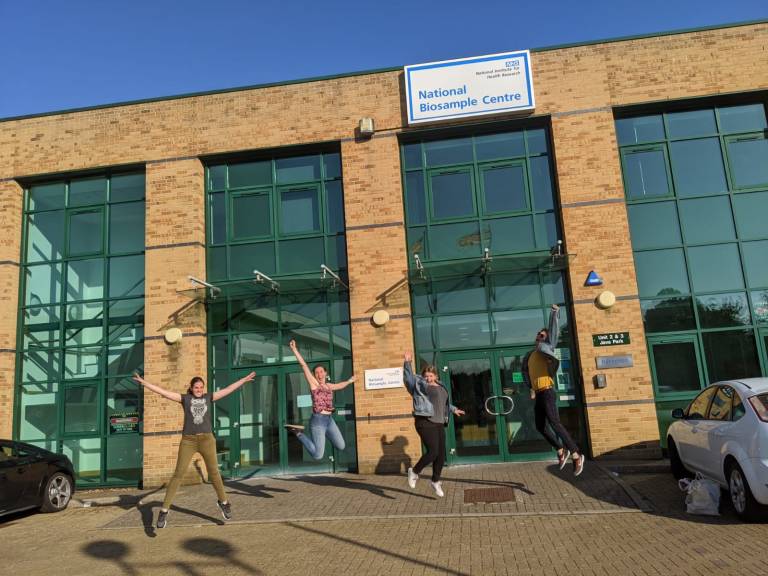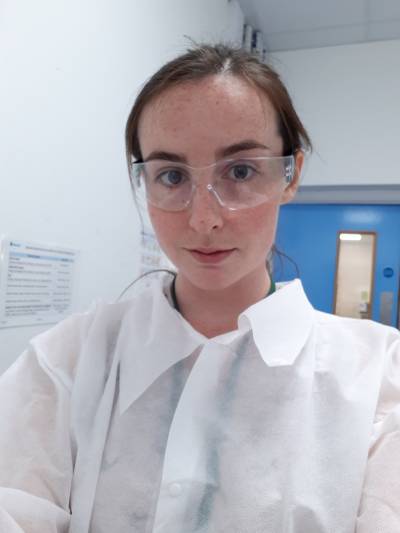Natalie Holroyd: life inside a COVID testing centre
28 July 2020
When UCL was forced to close its doors, PhD student Natalie worked at a national COVID testing centre.

Natalie Holroyd is a PhD student in the UCL Centre for Advanced Biomedical Imaging (CABI). Like many researchers her work is lab-based, so when UCL closed, so did her experiment.
At the height of the pandemic, Natalie was able to apply her lab skills at the National Biosample Centre in Milton Keynes. We spoke to her about her experience.

Natalie in her lab coat at the testing centre
How did your life (change as a result of COVID?
When UCL shut down I was in the middle of a lab-based experiment and found there was very little work I could do from home. As someone who needs to have things to do, I went a little lockdown-mad very early on! I also struggled knowing that so many of the things I’d been looking forward to over the coming months would be cancelled – running the London marathon, completing my PhD, getting married – so I started looking for something productive I could do while my experiments were on hold.
How did you begin working at the National Biosample Centre?
I knew a couple of other UCL scientists who’d gone to work in the COVID testing lab, so once I’d exhausted any PhD work I could do from home, I searched online for how to apply to the Biosample Centre in Milton Keynes. There was a bit of a wait to get started but a few weeks later I was called up and invited to an induction day. The scale of the lab was quite surprising – it was huge!
What was your role there?
My official role was as the lab assistant for my shift team, which meant making sure everyone had the supplies they needed throughout the 12 hours shifts and clearing out the waste – not a glamorous job but it had to be done! In practice, this didn’t take up all my time so I was also training to carry out various stages of the testing protocol and dropped into whichever team needed the extra pair of hands.
What skills were needed to perform your role?
Going in, it was only a familiarity with general lab work and the ability to pick up new skills quickly that was needed. Over the first few shifts, I was taught to use Tecan automated processing machinery and shown how to extract RNA using Kingfisher machines. I loved having the chance to learn these new skills because I’d never used these systems before.
Was there anything you found particularly enjoyable or challenging?
I really enjoyed being part of a very dedicated team. It was a unique environment unlike anything I’ve experienced before, and it’s heartening in difficult times to see people come together and work extremely hard to help others. I felt very lucky to be a part of that.
I found night shifts very challenging – especially as it meant not seeing much of my partner or our new puppy during my days off. The busy shifts could also be quite difficult – one day in particular we were working all out to get through a big delivery of samples and I forgot to take breaks to drink water. By the end of the shift, I was really dehydrated and had blisters on my feet!
Now you’re back at UCL, what’s your focus for the next few months?
Good question! My lab has reopened at 25% capacity, but I think it’ll take some time for everyone to work out how to make the ‘new normal’ work for experiments. I’ve started by trying to retrieve what data I can from the samples I’d been working on before lockdown. Next, I’ll be talking to collaborators and figuring out our plan for the summer.
Is there anything else about your experience you want to mention?
I just want to give a shout out to the people who’ve been working so hard in the testing labs for months now and are still working there. My old team have just switched back to night shifts for another 4 weeks. Without them, we wouldn’t be safe returning to work at UCL.
 Close
Close

